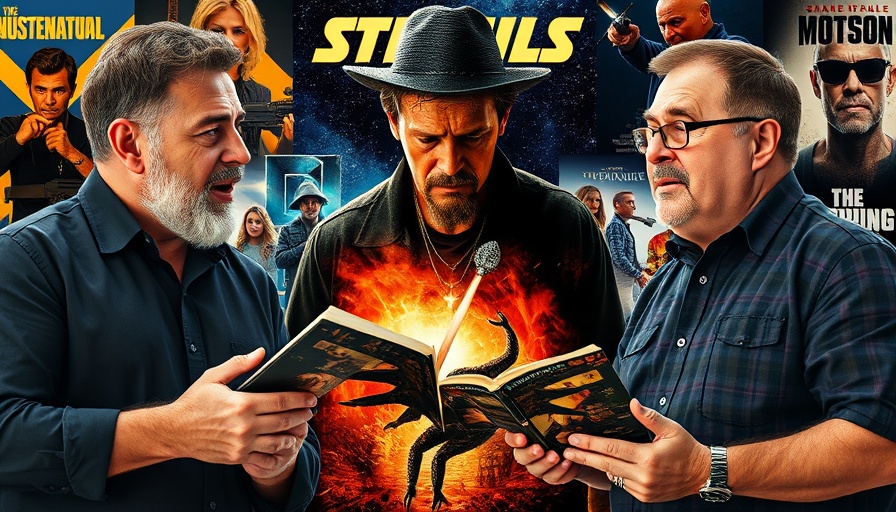
The Fascination with the Supernatural in Cinema
In the world of cinema, the supernatural has long been a source of intrigue. Films that explore ghostly apparitions, spiritual encounters, and the unseen world not only entertain but often provoke meaningful discussions about faith, doubt, and the mysteries of existence. For believers and skeptics alike, these narratives draw attention to questions about the nature of reality and the unseen dimensions of our lives, making them fertile ground for exploration and reflection.
In 'Uncovering the Supernatural: Two Must-See Films,' we explore captivating supernatural films and their profound implications, prompting us to analyze their relevance in contemporary discussions.
Why Films About the Supernatural Matter
Watching supernatural films can serve more than just entertainment; they can engage our imaginations and challenge our perceptions of reality. For Christians, these films can reaffirm belief in the spiritual world depicted in the Bible, while for skeptics, they pose intriguing questions and provoke deeper reflection on the nature of faith and the unknown. By analyzing how filmmakers address the supernatural, audiences may discover insights into their own beliefs about the spiritual realm.
Compelling Case Studies in Supernatural Cinema
Among the many supernatural films, two stand out for their depth and cultural impact: The Exorcist and The Sixth Sense. Each film dives deep into the complexities of human experience with the supernatural, revealing important truths about fear, faith, and the quest for understanding.
The Exorcist: A Classic Exploration of Good and Evil
This 1973 horror film remains one of the most iconic representations of possession and exorcism. It grapples with themes such as the battle between good and evil, the implications of faith when faced with raw evil, and the struggle for hope in despair. Through its haunting atmosphere and genuine emotional weight, The Exorcist pushes viewers to confront their ideas of morality and spiritual forces at play in everyday life.
The Sixth Sense: Understanding the Unseen
Contrastingly, M. Night Shyamalan’s The Sixth Sense dives into the realm of the unseen in a more personal and psychological manner. The film presents a relationship between a troubled child and a therapist, showcasing the intersections of fear, healing, and acceptance. As the narrative unfolds, audiences are led through a rollercoaster of emotions and ultimately provided with a heartwarming message about embracing the unseen aspects of life and death.
Connecting Supernatural Narratives with Faith
Engaging with supernatural films can be a potent way for believers, especially youth and college students, to discuss their faith with peers in a relatable context. These discussions can help illuminate theological concepts such as the nature of the spiritual warfare described in Ephesians 6:12 and the role of faith in confronting personal fears. Parents, educators, and church leaders can leverage these films to engage younger audiences, encouraging them to reflect on the relationship between cinematic narratives and their personal beliefs.
Encouraging Healthy Dialogue Among Diverse Perspectives
As discussions around supernatural films can bring together a wide range of perspectives—from believers and skeptics to cultural critics and intellectuals—it's crucial to approach these dialogues with an open mind. By exploring various interpretations and critiques of these films, individuals can deepen their understanding of both cinema and spirituality, fostering empathy and insight among differing viewpoints. This intersection of faith and skepticism can help cultivate meaningful relationships and thoughtful explorations within communities.
Concluding Thoughts: The Value of Supernatural Films in Cultural Discourse
The discussion surrounding supernatural films is not just about cinematic techniques or the scares that linger after the credits roll; it's a poignant opportunity for enriching dialogue about faith, fear, and the complexities of life. As we uncover narratives that challenge our understanding of the unknown, we empower ourselves to engage thoughtfully with profound questions about existence, belief, and the unseen. Ultimately, whether you're inclined to see the films as allegories of faith or as mere fiction, they provide a valuable platform to explore and examine the human experience.
For a deeper dive into how supernatural narratives intersect with faith and culture, explore the fascinating discussions emerging from these films. They help illuminate the rich complexities of belief and skepticism, inviting everyone—believers and seekers alike—into the conversation.
 Add Row
Add Row  Add
Add 








Write A Comment